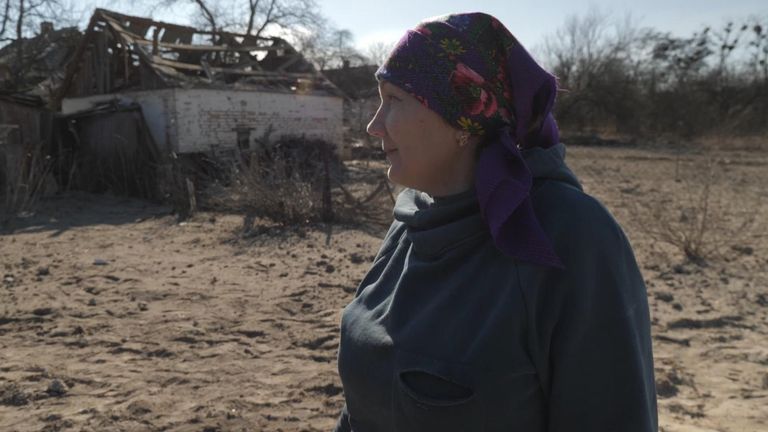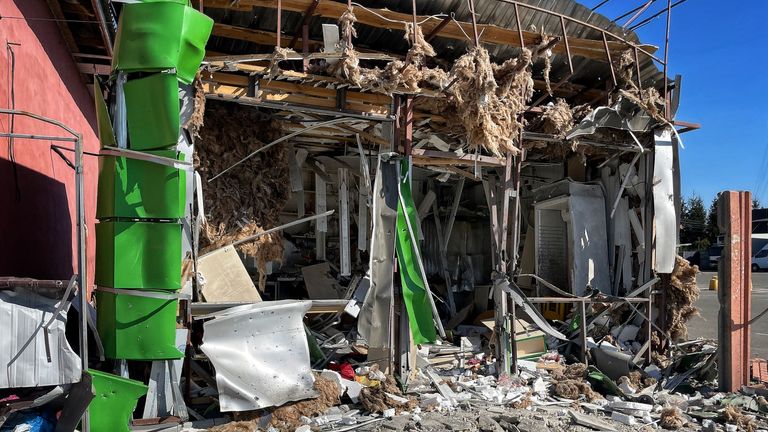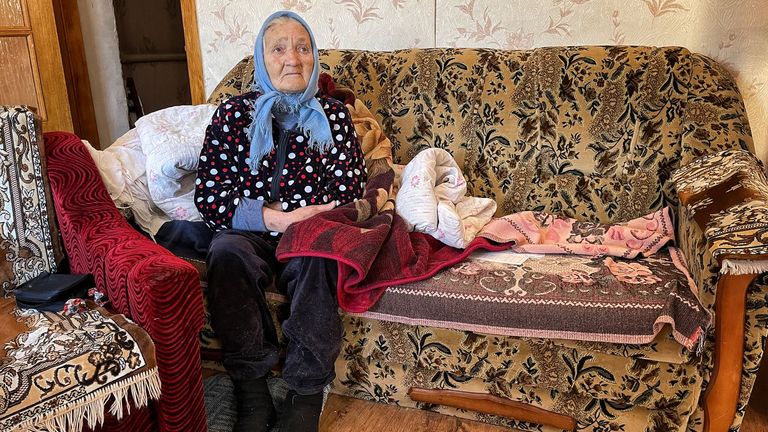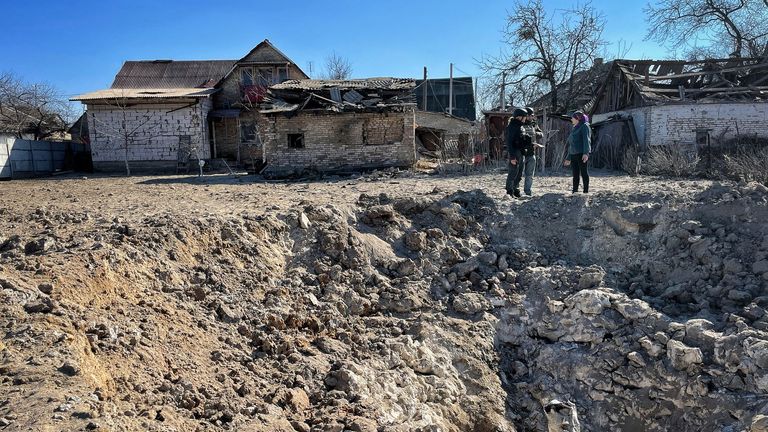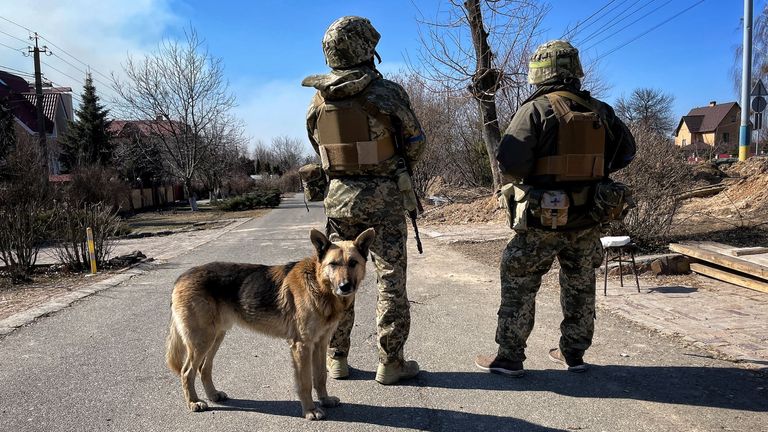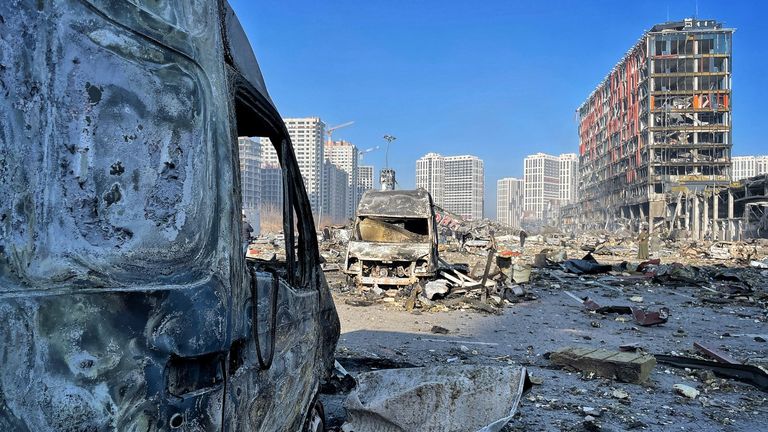Ukraine war: 'I can't let this happen' - British volunteer among defiant troops and survivors in Kyiv aiming to keep Russians at bay
Sky's Alex Crawford talks to people in a northern suburb of Kyiv, where they "know how to protect ourselves if we're being attacked".
Tuesday 22 March 2022 07:06, UK
The whistle of rockets and booming thud of landings seem to be horribly constant while we are in the capital's northern suburbs.
A fire has broken out in the field where the latest rocket has landed minutes earlier, causing the flames to spread quickly.
The soldiers on the checkpoints are frantically waving us through: "Faster! Faster!" they shout.
The residents who live here on the outskirts of Kyiv know they are the ones holding the line against Russians entering the city limits from this direction - and they appear understandably nervous.
Today's key developments:
• Ukraine has refused to give up the besieged city of Mariupol despite Russia's demands to surrender
• Another curfew lasting 40 hours from Monday night has been announced in the capital Kyiv
• Kremlin says more progress needed in peace talks before Putin and Zelenskyy can meet face-to-face
• Ukraine's nuclear regulatory agency says the radiation monitors around the Chernobyl have stopped working
• Russia has claimed it targeted a shopping centre in Kyiv because it was being used to store rockets
Ukraine war live updates: Russia-US relations 'on brink of collapse'
There's a very resolute and resigned determination, though, and in the dimly lit supermarket which had been hit days earlier in Lyutizh, they've quickly boarded up the shopfront and are once again open for business.
The staff are wiping down the bottles and tins which have been showered with dust and glass from the latest attack and are carefully putting them back on the shelves.
A number of fridges and storage units appear damaged from the flying shrapnel and there are a few empty containers which indicate perhaps that some stocks have been depleted.
But when we speak to one of the staff, Natalia Trofimova, she smiles and tells us: "We have good protection, and we work here very well. We can already identify our own fire or the enemy fire…if it's ours, we continue working, if it's our enemy's, we run.
"We know how to protect ourselves if we're being attacked. We lie down and cover our heads."
She gives us another big smile as if it's the most natural reaction in the world.
They've had to adapt quickly. The volley of rockets which rained down on the community recently tore into homes, peppered the school, hit workplaces and reduced businesses to crumpled wrecks.
The civil defence is still reeling from the shock of it all. But with the Russian troops at the gates of their town, they're now digging more trenches, bolstering defences and building up piles of metal spikes to throw on the road to try to slow them down.
Nadia Kravchanko leads us into her back garden, where she was growing crops just days ago. It's now covered in a thick blanket of soil which has been thrown up by a rocket which landed just yards from her back door.
It's created a deep crater, and parts of the rocket are still sticking up out of the centre of the dust bowl it's carved out.
She lives alone with her 81-year-old mother, Maria, and the two were shaken to their core when the rocket landed.
"It was an incredible noise," she explained. "We were inside the house and somehow the outside barn saved us. God loves us. We are blessed. I don't know how we are alive."
She goes on to say: "Granny was born during the Second World War. Now she has to survive another."
The octogenarian is listening to her daughter, wiping the tears from her eyes silently. "Oh, it's terrible, terrible," Maria Yakubenko says.
Her daughter interrupts her. "Children are dying, women are dying," Nadia says. "This is not just war, this is genocide of people…they're just killing us to eliminate us…They want to remove us from the surface of the land."
This community - like so many others across the country - is pulling together in ways they never believed possible a few weeks ago.
A man who was coaching swimmers less than a month ago is side by side with another who was working on television scripts then.
The two are manning a checkpoint together and looking every inch like the foot soldiers they now are.
They pause as the sound of a missile coming in echoes around us. Oleg Minako is in the middle of giving us a lurid description of what he thinks of the Russian troops invading Ukraine.
He halts only momentarily to try to work out how far away the incoming rocket is, then carries on. This has become a horribly familiar pattern to them all now.
We're introduced to a British volunteer - Leon Cribb - who tells us he was an ambulance technician in Chichester but decided to get on his motorbike and just head to the war zone about two weeks ago.
He's now part of the troops trying to defend the capital. "I thought to myself, how could I not do something about this," he says.
"How could I not go out there and help, especially seeing the war crimes being committed on civilian populations. I just thought, I can't sit by and let this happen."
He can't speak the language, so chatter must be a little slow and tricky on the frontline, but he insists he's been made very welcome and is helping to drive ambulances taking casualties to safety.
The Ukrainian civil defence fighter with him gives him a big hug - no common words, but there's a common purpose binding the two together.
It's the same bond which has drawn the community of Lyutizh together, and which is fuelling them with determination and grit to keep Russian troops out of the capital.

